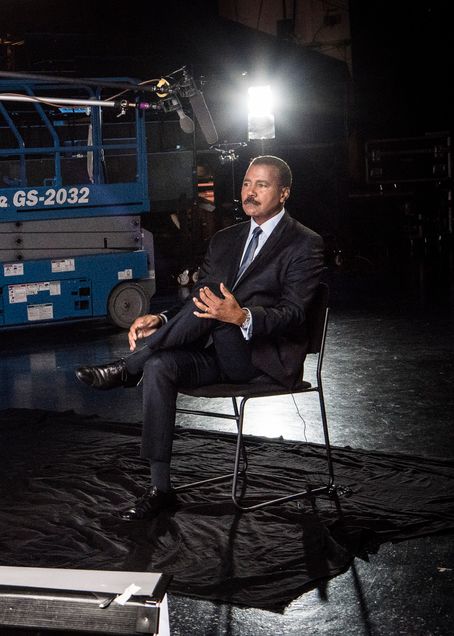Finding a "Journalism Bug" at the Graduate School of Arts & Sciences
60 Minutes Correspondent Bill Whitaker (GRS’74), who earned a masters in African American Studies, receives a BU Arts & Sciences Distinguished Alumni Award
60 Minutes Correspondent Bill Whitaker (GRS’74), who earned a masters in African American Studies, receives a BU Arts & Sciences Distinguished Alumni Award
When Bill Whitaker (GRS’74) graduated from college, he had his sights set on a trip cycling down the West Coast with a friend.
Instead, at the suggestion of a college history professor, he applied on a whim to a new master’s program in African American Studies—now African American & Black Diaspora Studies—at Boston University.

Today, Whitaker is an accomplished broadcast journalist whose decades-long television career has taken him around the world to interview politicians, public figures, and celebrities—from American Actor and Producer Denzel Washington to Vice President Kamala Harris to French President Emmanuel Macron. And who says none of this would have been possible if his endless curiosity had not led him down this path.
For all of these accomplishments, which he attributes to getting a “journalism bug” at BU, he is receiving the 2024 Arts & Sciences Distinguished Alumni Award.
“I never did ride down the West Coast with my friend on bicycles, but this program introduced me to the world, and it introduced me to the type of work that I have made my career,” Whitaker says. “And this job has allowed me to go places I would never have imagined and meet people I could only have dreamed of meeting.”
The catalyst? A recommendation from Robert Reinitz, professor of history and mentor at his undergraduate institution, Hobart College.
The program was relatively new at the time, but Reinitz had a connection to Professor Adelaide Cromwell (Hon. ’95), a former BU professor of sociology who founded the African American Studies Program in 1969, and Reinitz had directed other students to continue their studies at Boston University.
Whitaker says he took the recommendation, applied to the program, and found himself at BU that fall pursuing his master’s studies.
“He saw something in me that I hadn’t seen in myself,” Whitaker says of Professor Reinitz.
During the program, Whitaker and two of his classmates went on a life-changing trip to study the labor movement in Liberia.
While there, Whitaker says they were tasked with interviewing union members, union leaders, and government officials and writing up the interviews. It was here that Whitaker says he “got the journalism bug.”
After completing his master’s degree, Whitaker mentioned to Cromwell that he was interested in studying film and TV. She recommended that he look into BU’s newly-launched video production unit, BU Productions, which had been hired ahead of the bicentennial of the state to film new video content for historic sites and museums.
There, Whitaker cut his teeth in video production, visiting Lexington, Concord, and other Massachusetts towns to research, find, and interview people who had connections with town’s history.
“That’s sort of when it hit me that I like this whole process of interviewing people, and cameras would come out and shoot the interviews, and we’d put them all together and come up with this little film that would run in the visitor center.” Whitaker says. “I got that interest, that curiosity to see the world from the program there at BU.”
Whitaker’s work with BU Productions led him to pursue his second master’s degree—in journalism—from UC Berkeley and to go onto his career in broadcast journalism. Whitaker started as a reporter for CBS news in 1984, and became a correspondent for CBS’ 60 Minutes in 2014.
And, he says, his foundation in history and African American studies has continued to inform his career in journalism, including how he understands the stories and subjects he’s reporting on. He calls himself a “generalist,” reporting on topics from politics to natural disasters.
“I sort of am interested in and curious about just about everything,” Whitaker says. “I get to pick [people’s] brains. I get to ask them what makes them tick. I get to see what their creative process is or their political bent is, and it’s a real gift.”
And he remains in awe of the stories, places and people he has had the opportunity to meet and report on over the years.
In 2017, Whitaker received a Peabody Award for “The Whistleblower,” an investigative piece on the origins of the opioid crisis in the U.S., and how pharmaceutical companies had taken a complicit role in the crisis.
Whitaker said the breaking of the story was one of his proudest moments. He revealed how the pharmaceutical companies had been complicit in the crisis or looked the other way in favor of the income they were making from individual addictions. He says there were officials who were up for positions in the Trump administration that had to pull out of the pool of candidates due to what Whitaker’s story had revealed about the crisis.
Whitaker says his 2023 story on a volcanic eruption in Iceland is among the other memorable stories he’s pursued. He vividly remembers going to the active volcano site and how the site engaged all senses from the heat to the smell of sulfur.
“When you saw it, it really just made you stop in your tracks and say, ‘Oh my God, look at that,’” Whitaker says. “The Earth is just this magnificent thing. I will never forget that.”
Whitaker describes his work as “a gift” and credits his interest and curiosity in traveling the world and covering stories from his program at BU.
“I find people endlessly fascinating and the great joy of this job is that I get to see something, meet someone, go somewhere different all the time,” Whitaker says. “I’ve been doing it so long now that I’ve been telling people that if I never see another airport, I’ll be happy. But that’s not actually true, because I like what’s on the other end of the flight.”